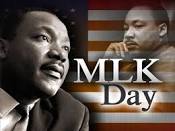 On the third Monday of January, Americans celebrate the birthday of Dr. Martin Luther King, Jr, perhaps the most important leader of the Civil Rights Movement. King was born on January 15, 1929, in Atlanta, Georgia, in an American society that had strict laws and customs that were based on the color of your skin. This legal policy called segregation separated whites from non-whites in nearly all public places and limited the ability of black Americans to completely enjoy the benefits that come with living in a free country. Raised in a strong Christian environment, Martin Luther King, Jr. believed that the best way to change the United States and end segregation was to win over the hearts of fellow Americans by following the teachings of Jesus Christ to “love your enemy” and by following the example of non-violent leaders such as the Indian Mahatma Ghandi. In large part due to Dr. King’s words and example, Americans ended segregation in the 1960s and today enjoy perhaps one of the freest societies of the world, where people are judged on their character and actions more than on their physical appearances. Tragically, on April 4, 1968, Dr. Martin Luther King, Jr. was assassinated by confirmed racist James Earl Ray. Racial segregation became a way of life in most southern states after Reconstruction ended in 1877. During Reconstruction, the U.S. attempted to “reconstruct” the Confederacy that had just lost the Civil War. Larry Schweikart writes in A Patriot’s History of the United States that in Reconstruction (1867-1877), the U.S. attempted to readmit members of the Confederacy, rebuild the South, and help the freed men and women to live and work in a hostile environment. When Reconstruction ended, the northern soldiers went home, and the southern whites enacted laws that separated whites from non-whites. In practice, segregation greatly limited black Americans’ ability to work, kept black Americans from voting, and created a permanent underclass where blacks did not enjoy the protection of the U.S. law. Economic and social mobility was nearly impossible for black Americans, and in many southern states, black Americans were in constant physical danger. They were terrorized, brutalized, and murdered in astonishing numbers. The Supreme Court, in Plessy v Ferguson (1896) legalized racial segregation. Segregation was the legal policy of separating the races, but it also meant that black Americans would always constitute a permanent underclass. Childhood and Young Adulthood Martin grew up in a strong, religious family. Originally named Michael like his father, he changed his name after the famous founder of the Lutheran religion, Martin Luther. His grandfather founded the Ebenezer Baptist Church in Atlanta, and when he died, Martin’s father became the pastor. Martin attended Booker T. Washington High School, where he skipped both the ninth and the eleventh grades. At age 15, he entered Morehouse College in Atlanta in 1944. As a junior in college, he decided to follow in his father and grandfather’s footsteps to become a pastor. As a doctoral student of theology at Boston University, Martin met Coretta Scott, a singer and musician at the New England Conservatory. They married and eventually had four children. King received his Ph.D. in 1955 and became pastor at the Dexter Avenue Baptist Church of Montgomery, Alabama. Adulthood In the 1950s, many in America realized that the policy of segregation was unjust and against the basic ideals of the United States. Many black Americans had fought and sacrificed in World War II and were currently fighting and dying in Korea. It seemed horribly unfair, then, that at home, black Americans did not have equal rights with white Americans. Those who wanted to change segregation were faced with many options. One was just to wait until things changed, somehow. Another option was to turn to violence and to force white America to change. Martin Luther King, Jr. chose a third option. A strong Christian and student of nonviolent methods, King believed that the most effective and just way to promote change in America was to love your neighbor and win over his heart. King’s choice was not an easy one, and he bore the pain and suffering of his decision. However, his way of nonviolence and love most likely saved the lives of many, and brought about immense change in the United States. In 1955, a brave and simple act by Rosa Parks, a 42 year-old woman, began the Civil Rights Movement and the national leadership of Dr. Martin Luther King, Jr. In Montgomery buses, blacks had to sit in the back of the bus, and if there were no more white seats towards the front, blacks were supposed to stand and allow the whites to sit. Rosa Parks sat in the black section, but was ordered to stand by the bus driver because there were a few whites who had no seats. Parks refused to stand, was arrested, and fined. Black community leaders met and decided to fight the bus company. They chose Dr. King, Jr. to lead a bus boycott and force the bus company to change its policy. After 382 days of avoiding bus travel, enduring harassment, violence, and intimidation, the blacks of Montgomery forced the company to desegregate its buses. The Civil Rights Movement had begun, and Dr. Martin Luther King, Jr. became the noted leader of peaceful, nonviolent resistance to the unjust system of segregation in America. Dr. King, Jr. was involved in many more Civil Rights battles, was jailed, and was eventually murdered for his desire to see a color-free American society. A moving orator, King, Jr. is most recognized for his “I Have a Dream” speech given in Washington, D.C. in 1963. It is here where King spoke of his dream of an America where children would grow up in a country where they would be judged based on the quality of their character and not the color of their skin. Segregation officially ended in the United States by the passage of various laws in the 1960s. On April 4, 1968, Dr. King, Jr. was assassinated by white supremacist James Earl Ray. Ray fled the country, was found in London, convicted, and sentenced to 99 years in jail. In jail, he recanted his testimony, pled his innocence, and died in 1998. Four days after Dr. King's death Congressmen began an effort to have a federal holiday in honor of him. However, some Americans felt that he was just one person of many in the Civil Rights Movement. And, some Americans were upset that segregation ended. In 1983, President Ronald Reagan signed into law holiday legislation, making the third Monday in January the day to honor Dr. King, Jr. Even after the federal holiday was declared, several southern states included celebrations for various Confederate generals on that day, and some states protested. Questions For elementary through high school: Answer these questions from the text: 1. When was Dr. King, Jr. born? 2. What was his original name? 3. Why did he change his name? 4. What was his wife’s name and how many children did they have? 5. What grades did Martin skip in high school? 6. What was Dr. King, Jr.’s occupation? 7. Was religion important to Dr. King, Jr.? Explain your answer: 8. What was segregation? 9. How did the Civil Rights Movement begin? 10. Who were Dr. King’s role models and how did these role models affect Dr. King, Jr.? Questions for junior high and high school students:
4 Comments
Diego Romo
1/18/2019 09:36:42 am
Very helpful information. I will always go to this website to learn more about topics like these.
Reply
Wendy
1/21/2019 05:54:23 am
Thanks for writing this up - perfect to share with my children on MLK Day 2019!
Reply
Jodi Unangst
1/21/2019 12:58:45 pm
Thank you for this excellent lesson! It provided for a great family discussion this afternoon.
Reply
Robin
1/15/2024 11:54:30 am
This article states that “ Dr. King, Jr. was assassinated by white supremacist James Earl Ray.” This overlooks the vast evidence that the US government was behind King’s assassination. There was a court case won by King’s family that documents this: “ The Loyd Jowers trial, officially the King family vs. Loyd Jowers and other unknown co-conspirators, was an American wrongful death civil suit brought by the family of Martin Luther King Jr. against Loyd Jowers, following his claims of a conspiracy in the assassination of the civil rights leader in 1968. The jury would eventually decide in 1999 that there was a conspiracy perpetrated by Jowers and other conspirators, including various United States government agencies, to murder King and frame James Earl Ray as a patsy.”
Reply
Leave a Reply. |
John De GreeJohn De Gree writes the current events with a look at the history of each topic. Articles are written for the young person, aged 10-18, and Mr. De Gree carefully writes so that all readers can understand the event. The perspective the current events are written in is Judeo-Christian. Receive Articles and Coupons in Your EmailSign Up Now
For Email Marketing you can trust. Archives
June 2024
Categories
All
|
|
SUPPORT
|
RESOURCES
|
|


 RSS Feed
RSS Feed



